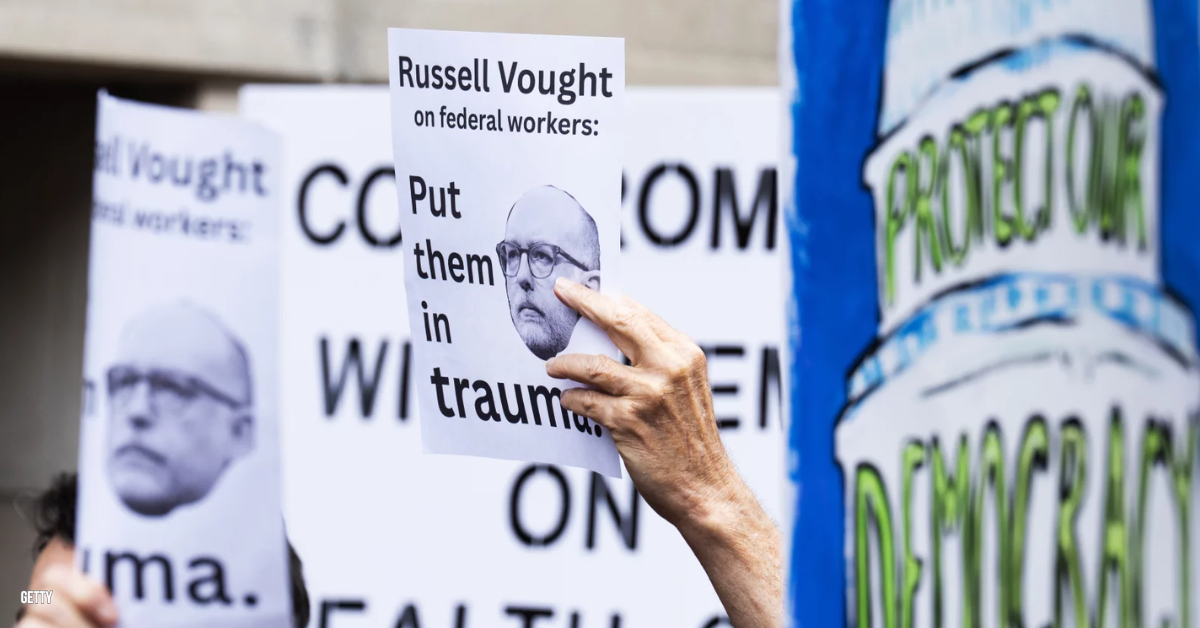NEWS ROUNDUP
‘Sad reality’ | Wage theft | Layoffs halted
Wednesday, October 29, 2025
STRIKES
► From KTVI — Boeing rejects union’s counteroffer; St. Louis strike continues — On Tuesday, FOX 2 learned that IAM 837 shared the following message on the counteroffer to union members: “The company rejected our counteroffer and said they’ll only accept a deal within their “parameters.” Our members have rejected four offers within the company’s parameters. We’ve bargained in good faith and were the last to move. The company owes us a counter, not more delays. Your bargaining committee will consider a company counter that moves us toward a fair deal.”…Boeing claimed the union rejected its latest contract offer by a narrow margin—51% to 49%. However, union members who spoke with FOX 2 after the vote said the offer still fell short of contracts reached at other Boeing sites around the country, with St. Louis workers arguing the contract had become more demanding, with fewer improvements to benefits and retirement plans.
► From the IAM — Bipartisan Group of House Armed Services Committee Members Urge Boeing to Negotiate in Good Faith as Military Deliveries Fall Further Behind Amidst Strike — The bipartisan letter—led by U.S. Reps. Donald Norcross (D-N.J.) and Don Bacon (R-Neb.)—calls on Boeing CEO Kelly Ortberg to “return to the bargaining table with IAM District 837 and negotiate a fair contract in a timely manner,” citing the growing impact of the strike on national security and U.S. defense programs. Boeing’s failure to propose a fair contract has already led the U.S. Air Force to publicly acknowledge that F-15EX deliveries are delayed.
LOCAL

► From the Seattle Times — WA to direct $2.2 million a week to food banks as SNAP cutoff nears — Nearly 930,000 low-income people in Washington — or more than 1 in 10 residents — rely on the federal anti-hunger program to keep their fridges full and pantries stocked, with roughly $37 million of federal funds going to homes across the state each week. Many will turn to food banks and food pantries as their last resort. Ferguson announced Tuesday he will direct the state’s Department of Social and Health Services to shift nearly $2.2 million per week in funding to the state Department of Agriculture, which provides grants directly to food banks. The first transfer will be made Nov. 3 if a budget deal isn’t brokered or legal efforts to restore funding are unsuccessful, Ferguson said, and will continue weekly until federal dollars for SNAP are restored.
► From the Spokesman Review — ‘A sad reality’: Food banks, grocery stores, residents expect to feel the strain from impending SNAP benefit expirations — Even with all that food, food banks like Second Harvest won’t be able to fill the need left by the impending pause on food stamps, or the federal Supplemental Nutrition Assistance Program, from the government shutdown. “SNAP distributes about nine times as much food as the charitable food system; it’s very large,” said Eric Williams, community partnerships director at Second Harvest. “We know from past, whether shutdowns or similar things, when SNAP benefits are paused, people come to the food bank.”…As for the local economy, the SNAP dollars represent a large portion of some stores’ revenue. Herzog said the average local family gets about $185 a month. If you multiply that by 83,000 recipients, that’s more than $15.3 million not flowing into area stores.
► From the Lynnwood Times — Alleged wage theft at Lynnwood’s ENSO Project, workers cheated, City censors union’s warnings — On September 18, 2024, the Western States Carpenters Local 425 union gave a presentation to the Lynnwood City Council warning them of how projects, similar to ENSO, traditionally set themselves up to be susceptible to an “underground economy” in the construction industry…If all 60 workers consistently worked 44 hours throughout the duration of the ENSO project, up until now, this number in unpaid wages (and state taxes) could be well over $3 million. ENSO is receiving $6.4 million in tax breaks from the City of Lynnwood through 2032.
► From My Northwest — ‘How am I going to pay my bills?’: Air traffic controllers object to working without pay — Off-duty air traffic controllers, at airports all over the country, including here in Seattle, spent the day handing out informational pamphlets. At the Seattle-Tacoma International Airport (SEA), they stood in three different skybridges, handing out pamphlets and talking to travelers about the strain air traffic controllers are feeling about working without pay, and the potential consequences of having such critical workers working for free…Air traffic controllers are working mandatory overtime, so, no time during the day to work a second job to make ends meet.
► From the Tri-City Herald — Are Hanford federal shutdown layoffs imminent? What we know — Energy department officials have not responded to questions about furloughs of federal workers while the federal government remains shut down, but multiple employees at Hanford have told the Tri-City Herald that furloughs are set to begin…Hanford has been getting by so far during the nearly month-long furlough by using money carried over from fiscal year 2025, which ended Sept. 30.
► From KING 5 — HCA eyes ‘substantial growth’ of investor-owned hospitals amid rising costs in Washington — Washington’s Health Care Authority (HCA) says the state has seen a “substantial growth” in hospitals owned by private-equity investor groups in recent years, a shift occurring alongside health care costs that continue to outpace wages, economic growth and inflation…“Research published by Harvard Medical School found patient deaths increased in emergency departments of hospitals acquired by private-equity firms with cuts to staffing and salaries the likely explanation,” said Aaron Keating, managing director at the Economic Opportunity Institute.
CONTRACT FIGHTS
► From the New York Times’ Athletic — WNBA collective bargaining agreement will not meet deadline, players’ legal counsel says — “We have worked hard to be able to say on Friday, we did it. Unfortunately, that’s not going to happen,” Erin D. Drake, senior advisor and legal counsel for the WNBPA, told The Athletic in Tuesday’s episode of the “No Offseason” podcast. “In a dance, it takes two to tango. And it has been difficult to find a beat, to find a rhythm and to find the same sense of urgency (from the league), just to be frank, to get this done.”
► From the Chicago Sun Times — U of C resident doctors win first-ever union contract after nearly a year of negotiating — Resident doctors and fellows at the University of Chicago Medical Center reached their first-ever contract with the health system following nearly a year of negotiations. The five-year contract for the roughly 1,000 residents and fellows “will have a direct impact on both their well-being and their ability to provide high-quality patient care to their patients,” according to the Committee of Interns and Residents, their union representation. The victory is the latest in a growing movement in Illinois and nationwide to unionize residents and secure contracts that make their working conditions more humane and sustainable.
NATIONAL

► From the Progressive Grocer — The Loss of SNAP Has More Consequences Than Realized — “Food assistance programs make sure that millions of families can put food on the table each month,” said Milton Jones, president of Washington D.C.-based UFCW International. “It’s not only helpful for families in need – it’s also an economic multiplier. Our entire food system – including UFCW members at grocery stores, meatpacking plants and food-processing plants across the country – benefits when SNAP families can buy groceries.” When families lose access to food assistance, grocery sales drop. That means fewer hours, fewer jobs and more strain on workers all along the food supply chain.
► From OPB — Trial over National Guard deployment in Portland begins — U.S. District Court Judge Karin Immergut, who temporarily blocked any federal troop deployments to the state earlier this month — will preside over the three day trial. Immergut will examine whether the Trump administration followed the statute that outlines when a president can federalize the National Guard and what the U.S. Constitution says about the authority of the executive branch to deploy members of the National Guard — or whether those efforts in Portland infringed on the state’s rights.
► From People’s World — Detroit seniors escalate fight against national corporate landlord — In August, McCormick and a group of her neighbors stood shoulder-to-shoulder outside their building at 800 Dickerson Ave. to announce the formation of the River Pointe Towers Tenants Union, a new chapter of the Detroit Tenants Union (DTU). They are taking on their New York-based corporate landlord, Capital Realty Group, demanding a collective bargaining agreement that contains, at minimum; pest control, fair leases, a working system for repairs, and basic safety and security. Their action places them on the front lines of a groundbreaking, multi-state tenant campaign that is showing working-class people how to build power from the ground up to challenge big real estate and corporate landlords.
► From Wired — CBP Searched a Record Number of Phones at the US Border Over the Past Year — Over the Past year, United States Customs and Border Protection staff searched more phones and electronic devices at the border than ever before, according to new statistics published by the government agency. Phone searches jumped around 17 percent during the past 12 months—with a marked increase over the past six months…Federal courts remain split on whether advanced phone searches require warrants. The answer can change with the airport. The Eleventh and Eighth Circuits allow suspicionless searches of phones, while the Fourth and Ninth require reasonable suspicion for advanced, forensic searches. Recent district-court decisions in New York go further, requiring probable cause.
► From the Spokesman Review — One day after massive immigration raid, Idaho school district saw absences soar — On Oct. 20, the day after the raid, almost 20% of students were out of school – about twice as many absences as normal, Superintendent Alejandro Zamora reported at a school board meeting Monday. The district is submitting a certificate to the state about the low-attendance day, citing a “welfare concern,” in hopes that it isn’t included when calculating the district’s funding…The state distributes funding largely based on average daily attendance, but school districts can avoid potentially being penalized for low attendance because of events that impact the health, safety or welfare of students. That can include if a district has to close because of a storm or on days when a significant number of students are out sick. If the request is approved, the district’s actual attendance on Oct. 20 wouldn’t impact calculations for its average daily attendance.
POLITICS & POLICY

► From NPR — Judge indefinitely halts shutdown layoffs of federal employees — The decision came almost two weeks after U.S. District Judge Susan Illston temporarily paused thousands of layoffs, known as RIFs, or reductions-in-force, at agencies where the federal employee unions that brought the lawsuit, including the American Federation of Government Employees, have members or bargaining units…On Tuesday, Illston said she believed the unions were likely to prove that the Trump administration’s actions were unlawful. She said she would hold another hearing to determine whether some of the RIFs announced since the shutdown began, including at the Interior Department and the Education Department, were in fact related to the lapse in appropriations. For now, they are covered by her order.
► From the Hill — Democrats possibly open to GOP plan to pay all federal workers during shutdown — Senate Democrats may be open to supporting a Republican proposal to pay all federal workers — essential and furloughed employees alike — during the government shutdown, but they say they need more time to review the details of the legislation. Sen. Ron Johnson (R-Wis.) has proposed to Democrats modifying his legislation, the Shutdown Fairness Act, to pay federal and furloughed workers, something similar to what Sen. Chris Van Hollen (D-Md.) asked for unanimous consent to pass on the Senate floor last week.
► From the AP — Federal Reserve likely to cut key rate Wednesday and may signal another cut to follow — A cut Wednesday would be the second this year and could benefit consumers by bringing down borrowing costs for mortgages and auto loans. Since Fed chair Jerome Powell strongly signaled in late August that rate cuts were likely this year, the average 30-year mortgage rate has fallen to about 6.2% from 6.6%, providing a boost to the otherwise-sluggish housing market. Still, the Fed is navigating an unusual period for the U.S. economy and its future moves are harder to anticipate than is typically the case. Hiring has ground nearly to a halt, yet inflation remains elevated, and the economy’s mostly solid growth is heavily dependent on massive investment by leading tech companies in artificial intelligence infrastructure.
► From KOIN — WA judge blocks Trump from cutting student mental health grant — The ruling comes after 16 state attorneys general – led by Washington Attorney General Nick Brown – filed a lawsuit in June against the United States Department of Education, alleging the administration unlawfully cut the grant funding, which was approved by Congress. The lawsuit argued that the cuts violate the Administrative Procedure Act.
► From the Spokesman Review — Ballots could now be tossed if voters submit them via U.S. Postal Service due to postmarking delays — Voters who have not submitted their ballots yet should stop submitting them through the mail due to unprecedented concerns ballots will not be postmarked in time for the election, according to recommendations from the Washington secretary of state. Postal union leadership and election officials say the U.S. Postal Service’s delivery of mail – and, critically for the upcoming election, postmarking – has been significantly delayed by multiple factors stemming from former Postmaster General Louis DeJoy’s “10-year plan” to reform the postal service.
The Stand posts links to local, national and international labor news every weekday morning. Subscribe to get daily news in your inbox.





